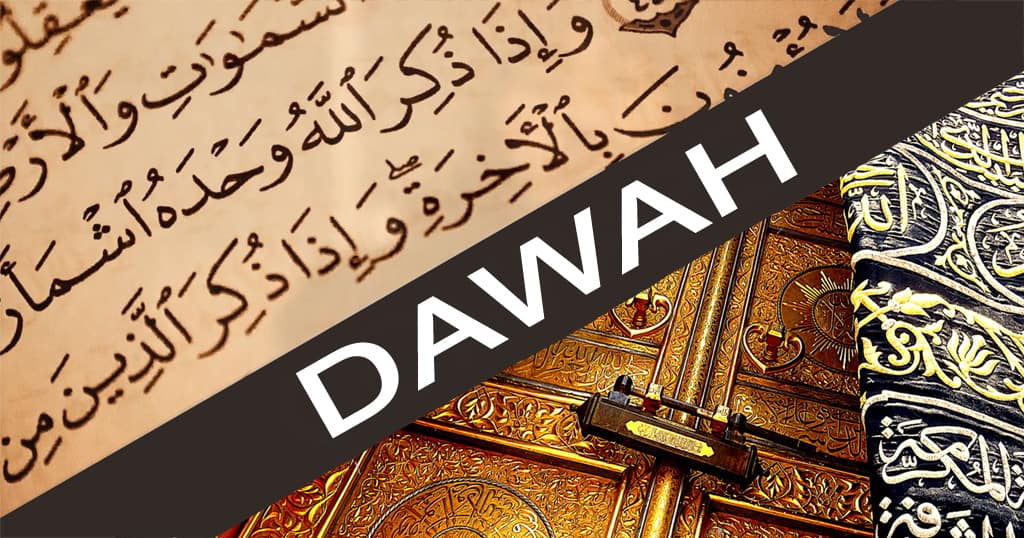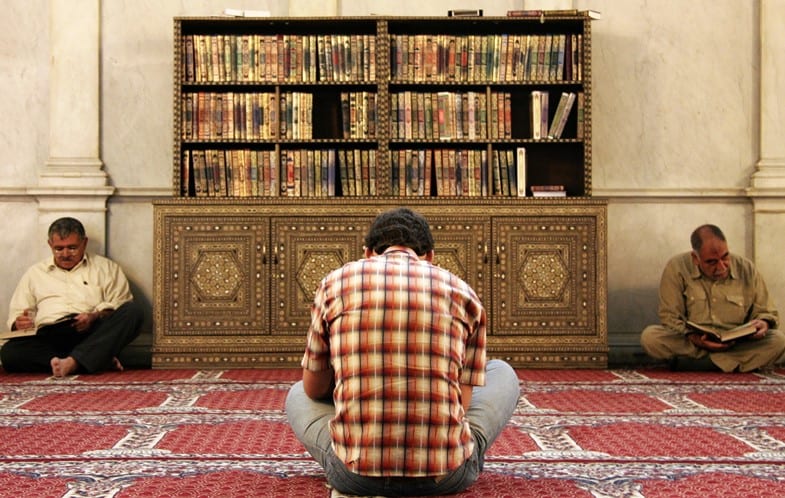This is an excerpt of a translation from an Arabic leaflet from August 1975 which aimed to provide advice to carriers of da’wah as regards their activism and what some of crucial activities they need to engage are. As important now as it was back then, it considers some of the serious commitments that need to be made in carrying the da’wah to Islam.
There are many issues in a person’s life which take their intellectual efforts and hence their time. Hence the person constantly exhausts their efforts, on various levels, in order to fulfill the commitments which these issues entail.
If we were to contemplate these issues to which a person dedicates his life, we would perceive that these take various forms and have varying incentives. People’s concerns towards their issues vary from one person to another and from one issue to another.
The truth of the matter is that by looking into the Shar’i rules and principles which organise people’s relations, a person’s engagement in satisfying one instinct may be at the expense of another, and this fits perfectly within life’s requisites. Despite all this, there ought to be a scale of priorities.
It is true that Allah (SWT) has commanded the capable Muslim to work in order to support himself and those dependent upon him and it is also true that Allah (SWT) has commanded the da’wah carrier to perform all that which the da’wah demands of him. The da’wah in fact should take primacy over all other commands. Allah (SWT) has placed the da’wah at the top of the scale, which is understood from evidences such as the hadith where his comment to his uncle Abu Talib was:
By Allah, O uncle, if they were to put the sun in my right hand, and the moon in my left hand, in order to relinquish this matter, I shall never do so until Allah makes it triumphant or I die without it.
The actions performed by a Muslim need to be means to achieve an objective. This objective would be the da’wah to Islam. This da’wah to Islam would include various aspects, the most important and most prominent of which would be the enjoining of the Ma’aruf (good) and the forbidding of the Munkar (evil).
In the Qur’an this is repeated many times in various suwar, and Allah (SWT) has made it an individual duty upon every Muslim, in addition to having already made it an obligation when He (SWT) commanded the establishment of groups to fulfill this duty.
We gather from the above that the enjoining of the Ma’ruf, the forbidding of the Munkar and the da’wah to Islam represent a host of carefully targeted aims which result from carrying the da’wah. It would be therefore imperative to undertake a host of specific tasks in order to achieve the above mentioned results. These tasks are not of less importance than the results themselves, for the results could not be achieved unless these tasks were undertaken.
If we were to examine these tasks, we would realise that they are many. However, they can be summarised in several heads:
1- The Islamic commitments
Total adherence to the Islamic commitments should be a given to the da’wah carrier, such that it would be strange to carry the da’wah if one did not abide to the letter of the halaal and haraam or adopt this as the basis of one’s discipline, work, thinking and effectively the basis of one’s whole life. However, it would be wrong to assume that the da’wah carrier need not be reminded about these issues.
This is so because the prime obligation upon the da’wah carrier would not only be confined to nursing a genuine desire for Jannah and a genuine fear of the hell fire, thus seeking the pleasure of Allah (SWT), but rather aiming to convey this sensation practically and intellectually to the people around him. S/he would not succeed in conveying this unless genuine sensation and true awareness about this were reflected in his/her own actions and sayings. Hence, it would be conveyed through the actions and the thought to those around such a person.
If the da’wah carrier succeeded in acquiring this genuine sensation of seeking the pleasure of Allah (SWT), then the first step towards establishing an ummah inspired by this genuine sensation would have been achieved. This would in turn motivate her towards sacrificing anything in order to achieve her objective and reach the position expected of the Islamic Ummah – one of spreading guidance and goodness throughout the world.
2- Tilawa (recitation) of the Qur’an
It goes without saying that the Qur’an is the basis of the deen which we hold with pride before the whole world. It is the revealed word of Allah (SWT) with which we are made to worship Him (SWT). In addition to the great reward gained from its recitation, the Qur’an is worthy of pushing the motivations and moving the people who have set their hearts and minds on working towards making the phrase “there is no god but Allah and Mohammed is the Messenger of Allah” reign supreme.
There is no heavier burden than the carrying of the da’wah and that is all the more reason for the da’wah carrier to recite the Qur’an. For the Qur’an charges the believer with an amazing energy which revives idle souls and alters their dispositions such that they trivialise hardships and make light of all worldly pleasures – for the sake of gaining the bliss of Jannah and the pleasure of Allah (SWT). Why do we have to go far since we are absolutely certain that victory is from Allah (SWT) and that we have no other hope but in Him (SWT)? So why should we not be eager to take provisions from the source of the Qur’an, ponder over its meanings and acquaint ourselves with its aims?
Therefore, it would be inconceivable for the da’wah carrier who feels a weakness in his or her soul to seek a better remedy than reciting the verses of the Qur’an over and over again. The book of the Holy Qur’an can never become overused no matter how much is recited from it, no matter how old it has became and no matter how many reciters of it there were.
The deen carries all the meanings of strife and struggle and thus it would be wrong to separate this deen from strife and struggle. There is no better incentive than the Qur’an to help carry the burden of struggle and strife, for the Muslim Ummah had become a nation of Jihad and sacrifice since she interacted with the deen and this was only thanks to the eternal book of Allah (SWT). To neglect the recitation of the Qur’an would therefore be interpreted as a decline in the perception of the deen, which ought to be at all times reflected in the highest scale of sacrifice and struggle.
3- Contacting people and conveying to them
There is no doubt about the fact that contacting people represents the general aspect of carrying the da’wah. One could not be called a da’ee if they did not establish relationships with people and did not acquaint themselves with their current affairs. It would be inconceivable to enjoin the Ma’aruf and forbid the Munkar if we did not find people to enjoin and forbid, nor would it be conceivable that we would be able to explain and convey thoughts and rules of Islam if we were to remain in isolation from other people.
The da’wah carrier would not be worthy of this title simply because of his affiliation to a group, because affiliation is subjected to the mere administrative rules drawn on paper. The affiliation is in fact no more than an administrative matter. Therefore, the priority would lie in these contacts and relationships, and the familiarisation which the da’wah carrier establishes with people. The priority would also lie in the actions which the da’wah carrier undertakes, in terms of studying people’s state of affairs, dealing with their sensations and reconditioning their thoughts with the thoughts and rules of Islam.
If we were to stand in surprise at anything, it would be of those who had known their exact positions in the fierce battle they are engaged in against Kufr and its systems but they plunged into a deep slumber, forgetting – or pretending to have forgotten – that they are fighting at the first line of defence. We have never known throughout the history of the Islamic da’wah a person who had embraced Islam and then lived in isolation from other people. Abu Tharr Al-Ghafari (R) embraced it, then the Messenger of Allah (ﷺ) ordered him to return to his folk but he refused to depart from Makkah before crying out the two Shahadas within earshot of the Mushrikeen of Makkah. He thus endured a beating under which the strongest of men would succumb, and at the time he knew from Islam nothing save for the two Shahadas!
Islam is a collective and universal deen, not an individual one. It is a deen whose natural environment is within the masses, as a ruling authority and in the international arena. As for those whose desire is to confine Islam to the darkness of prayer rooms and minarets, they are in fact assisting the Kuffar and their agents, intentionally or unintentionally, in their quest to isolate Islam from temporal life and current affairs in a way which would leave it devoid of the vitality and soul of Islam.
4- Reading
What we mean here by reading is the reading both of books which contain the da’wah’s culture (the Hizb’s) and those which contain the general Islamic culture, be it Fiqhi, intellectual or political.
One who carries the work of the Hizb and is working with it may wonder that since the party had already put its culture in books which it has adopted or published, and since the da’wah carrier adopts what the Hizb adopts, what would be the precise aim of searching and investigating other books?
The response would be that the da’ee is indeed obliged to propagate the thoughts which the da’wah has adopted. However, the books adopted by the party – while deep – are a host of rules related to certain realities; thus, it would be wrong to be satisfied with learning and quoting such rules, for these could not be separated from the realities which apply upon them.
Indeed the Hizb explains some of these realities in its books, but this was an abridged explanation which serves the purpose of highlighting the rule. However, this explanation would not be sufficient to make one understand the true nature (and essence) of these realities; thus, other books represent these realities and therefore they should be referred to and they should be read so that our perception of the adopted culture is coupled with awareness and not exposed to weakness. Therefore, the da’ee who frequently reads and researches would always remain in a better position to understand and perceive the thoughts and the culture of the da’wah.
Besides, he who is eager to influence other people should acquire sufficient awareness about what these people carry in terms of thoughts, opinions and Mathahib (schools of thought). Therefore, we would not be far from the truth if we said that the da’wah carrier who had acquired a greater deal of knowledge and study would be capable of influencing people’s thoughts and relations.
For instance, we say that the Khilafah is a distinguished system which is unlike any other system, that no other system is like it and that it is the only system valid to address people’s state of affairs for it is a system revealed by He Who knows better about the human being than the humans themselves, i.e. Allah (SWT). We also say that the democratic system cannot bring true satisfaction to humanity, but it is in fact just like other systems and a cause of humanity’s anxiety and instability for these systems are systems of disbelief, i.e they are man-made systems. Further, that the human cannot establish a system for himself, let alone establish a system for other people and implement it upon them unless he does this by force. When we say this we are here satisfying ourselves with the culture by the Hizb, and this understanding would remain nearer to the theoretical rather than practical.
What makes it an influential and practical understanding, close to the heart and the mind, would be our study of the systems in question (above). This would enable us to practically acquaint ourselves with the nature and corruption of these systems and their inability to bring happiness to those who come under their rule.
This study could be acquired from the books which talk about the various political systems of the world. The Hizb’s books would only give the basic judgement concerning these systems, but they do not sufficiently diagnose the reality of these systems in a way that would allow us to understand their elaborate details.
The same thing could be said of the Shariah rules adopted by the Hizb, which are the subject of difference among the Mujtahideen and the scholars. Therefore, the study of the evidences listed by those Mujtahideen and scholars, with the aim of ascertaining the extent of their validity, would strengthen our confidence in the evidences which the Hizb relied on. This study would be found in the books of the distinguished scholars.
We can list tens of examples to prove that reading other books, be they political or intellectual, as well as the Hizb’s books, would be indispensable for the da’wah carrier. We do not wish to say that reading would broaden the perceptions and develop the mentalities, nor do we wish to say that reading would set the reader on the first steps towards political awareness. What we wish to say is that (the very) carrying of the da’wah itself could not be achieved in an efficient and influential way unless reading and study were taken up.
5- Pursuance
We mean by pursuance the follow up of current affairs and daily news, for this would be different from reading, even though it is connected to it.
Pursuance would specifically include the reading of political newspapers and magazines and the listening to the news and anything similar. The pursuance of news represents the basic elements of politics, for there would be no politics without it.
When we say pursuance or following we mean to continue diligently and relentlessly, and not to break even for one single day. This is so because the daily events are a long running chain of events that are interlinked together. Therefore, it would be essential to pursue this long running chain so that the understanding of news and events is perfected, and so that we put ourselves in a position to pass upon these news and events a true judgement. We are not, in this context, trying to highlight the importance of political work and its effects in establishing the Islamic idea within the field of implementation and transactions. This is because we are supposed to have surpassed the stage of realising the importance of political work, to reach the stage of getting involved in political work and to perform its various commitments.
The point at issue in this context is to realise the importance of pursuing the news and events in political work. Analysing the news would undoubtedly be an important matter, as would be the voicing of one’s opinion regarding such news and linking the Islamic viewpoint to that opinion is most important. However, all this would firmly depend on the pursuing of daily news and events. Events do not wait for the one who pursues them, they take place and leave their marks even if no one pursued them.
Thus we ought to obtain the news as it occurs, and make sure that no event is passing us by without knowing about it and analysing it, and by Allah (SWT), how could the one who has no firsthand experience in pursuing events be able to make events happen in the not too distant future insha Allah?
This pursuance leads the pursuer to live the events and turns him into a person of energy who could live in the heart of a society and catch its attention. This would enable him or her to attract people and lead them. It would be wrong to ask whether the daily reading of a local newspaper or listening to a news bulletin on the radio would be sufficient to follow events; this question should not be asked because the point lies in the obtaining of the news from its most likely places, regardless of whether the source is a newspaper or a radio. This is so because one could read a newspaper everyday without fulfilling the purpose of pursuance, for most of the time reading the newspaper would not compensate for what could be missed by not listening to the news bulletin on the radio, and sometimes the same thing could be said about the radio as well. The main point would be not to allow the events to pass us by without at least acquainting ourselves with them.
These five matters – the Islamic commitments, recitation of the Qur’an, contacting people, reading and the pursuance of news – should be given ample care and attention in order to meet their requirements, and in order for the da’wah carriers to fulfil their responsibilities and live up to their title.
May Allah make us from those who carry His trust in the best manner, He is Al-Sami’i Al-Mujib. Ameen.
![]()















